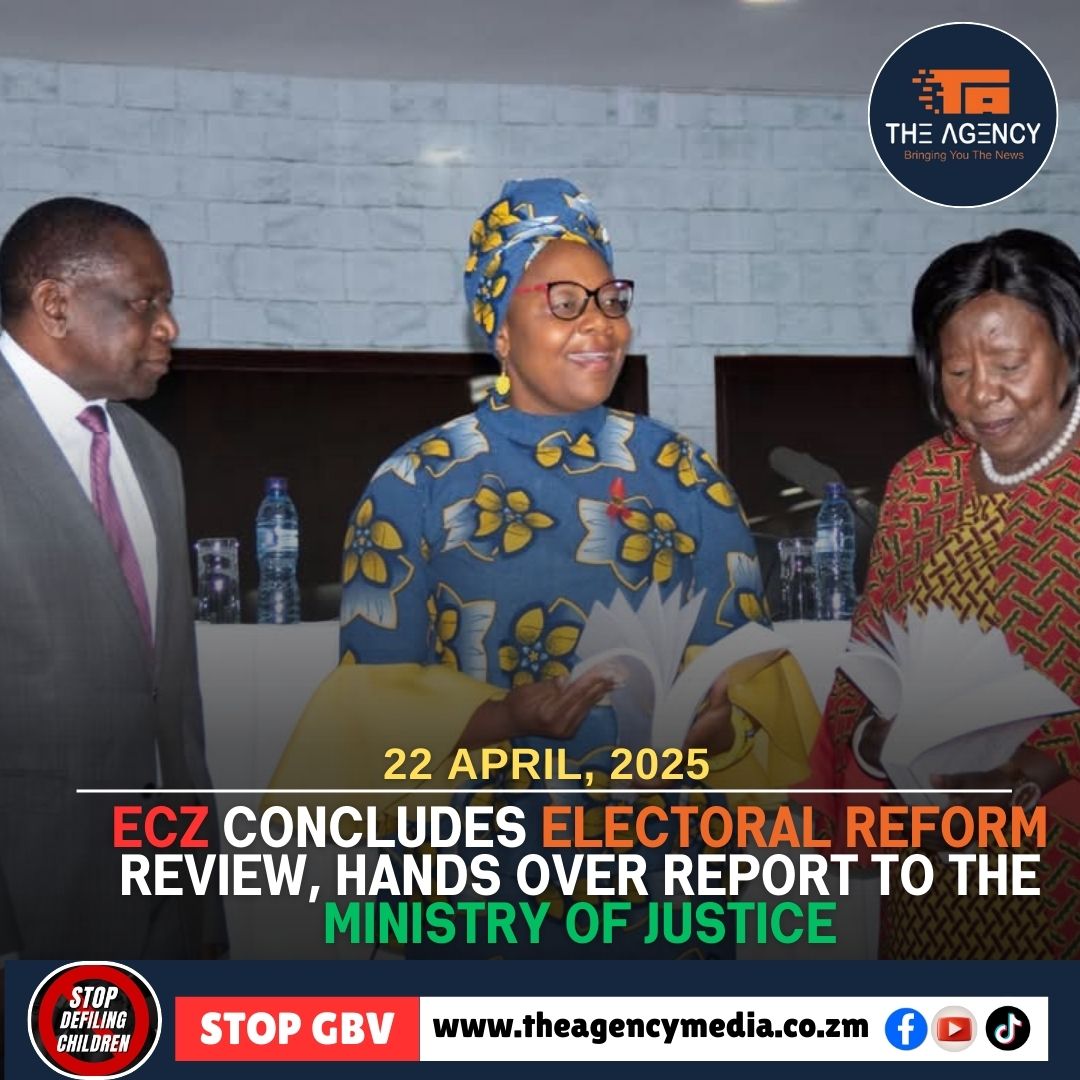Reported by: The Agency Media.
Date: 22th April, 2025.
Lusaka, Zambia.
In a landmark step toward strengthening Zambia’s democratic institutions, the Electoral Commission of Zambia (ECZ) has officially handed over the Electoral Reform Technical Committee (ERTC) Report to the Ministry of Justice.
The event, held at the Mulungushi International Conference Centre in Lusaka, marked the culmination of a year-long nationwide consultation and review process aimed at modernizing Zambia’s electoral framework.
Speaking at the handover ceremony, ECZ Chairperson Mrs. Mwangala Zaloumis, SC, described the occasion as a defining moment in the country’s democratic journey. She emphasized that the report, a product of broad-based consultation and legal scrutiny, would provide a solid foundation for future electoral legislation and policy.
“The handover of this report signifies not just the end of a technical process, but the beginning of a broader national conversation and legislative pathway to a more credible, inclusive, and efficient electoral system,” she stated.
A BROAD-BASED AND INCLUSIVE REFORM PROCESS
Established in July 2024 under Section 7 of the Electoral Commission of Zambia Act No. 25 of 2016, the ERTC was mandated to conduct a comprehensive review of Zambia’s electoral laws, policies, and administrative procedures. The Committee’s work included wide-ranging public consultations, held across all ten provinces, and received inputs from a diverse cross-section of society, including civil society, faith-based organisations, academia, law enforcement, and ordinary citizens.
The Committee’s mandate focused on four primary objectives:
- Reforming laws governing the electoral process to enhance election credibility;
- Identifying legal gaps requiring constitutional or statutory amendment;
- Harmonizing legislation affecting electoral processes;
- Proposing administrative and policy changes to improve electoral governance.
KEY REFORM RECOMMENDATIONS
Among the major proposals outlined in the report are amendments to the Constitution and the Electoral Process Act to address long-standing procedural and legislative challenges.
Constitutional Recommendations:
- Delimitation of Constituencies: To enhance representation and service delivery, the ERTC recommends increasing the number of constituencies through a constitutional amendment to Article 68.
- Election Cancellations: A proposed amendment to Article 52(6) seeks to clarify procedures in cases of candidate resignations, disqualifications, or deaths, aiming to avoid unnecessary election delays and costs.
Electoral Process Act Proposals:
- Nomination Reforms: The report calls for the introduction of a 14-day pre-nomination period and an extension of the nomination challenge period from 7 to 14 days, along with a reduction in nomination fees to encourage broader participation.
- Technology Integration: A forward-looking recommendation includes provisions for biometric voter registration, aimed at modernizing and securing the voter roll—while explicitly distinguishing this from electronic voting.
A Catalyst for Democratic Evolution
Mrs. Zaloumis praised the ERTC’s meticulous work, noting that the Committee had delivered a comprehensive, evidence-based, and forward-looking document that now sets the stage for legislative review and reform.
She also acknowledged the support provided by the Democracy Strengthening in Zambia Project, managed by the United Nations Development Programme (UNDP), which provided technical and logistical assistance throughout the ERTC process.
With the report now formally in the hands of the Ministry of Justice, the next phase involves governmental review, policy direction, and legislative implementation where necessary.
“Electoral reform is not a destination, but a continuous journey,” Mrs. Zaloumis concluded. “The Commission remains committed to working collaboratively with all stakeholders to ensure that the reforms reflect the will and aspirations of the Zambian people.”
The handover signifies a critical step forward in Zambia’s ongoing commitment to transparent, inclusive, and credible elections—one that could reshape the electoral landscape for years to come.
The Agency.

